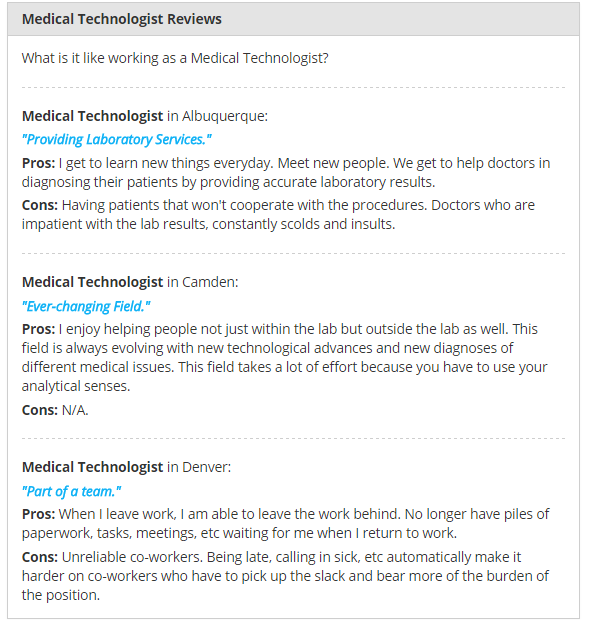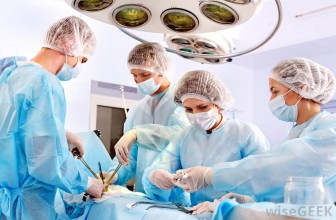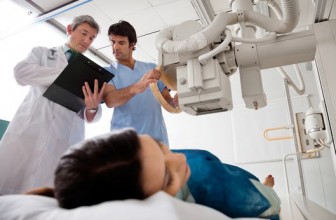
Also known as clinical laboratory technologists, medical technologists are health professionals responsible for performing and analyzing the result of complex scientific tests on body fluids and tissues. Such include blood, urine, and synovial fluids among other samples obtained from a patient for testing. Due to advances in technology, they make use of sophisticated equipment and procedures to ensure that they give accurate results for each test. The data that they obtain from the tests is helpful in diagnosis, monitoring, and treatment of patients suffering from various conditions and diseases. In most cases, the work of medical technologists goes unnoticed because they mostly work behind the scenes, but they make an immense and crucial contribution in the healthcare profession.
Contents:
- Educational Programs for Medical Technologist
- Work Environment for a Medical Technologist
- Certification as a Medical Technologist
- Important Qualities for a Medical Technologist
- Medical Technologist: Job Description
- Relevance of Medical Technologist Career
- Opportunities to Specialize as a Medical Technologist
- Salary of a Medical Technologist
- Interesting Facts about Working in the Lab
- FAQ for Medical Technologists
Educational Programs for Medical Technologist

- Bachelor of Science in Medical Technology
This course prepares one for a career as a medical technologist by equipping him or her with the necessary skills for sample testing and analysis. Through this program, the learners are taught how to conduct lab tests and interpret the results, and this is helpful in making diagnostic conclusions. They are introduced to laboratory equipment used in the career. The program is a combination of both classwork and clinical experiments. Major areas of study include:
- Phlebotomy
- Bacteriology
- Hematology
- Mycology
- Immunodiagnostics
- Urinalysis
In most educational institutions offering this program, the basic admission requirement is to hold a high school diploma or its equivalent. However, some specific educational institutions may have additional requirements such as physical examination, drug test, and proof of immunization. The completion period for this program is usually four years.
- Post-Baccalaureate Certificate in Medical Laboratory Science
This program prepares one to work as a medical technologist upon graduation. The option is for people who wish to join this career but are yet to get a degree in medical technology. It takes about a year or less to complete, and it equips students with knowledge of laboratory science and methods used in medical technology. The requirement for admission to this program is to hold a bachelor’s degree preferably in the field of science. The curriculum for this program covers topics such as:
- Hematology
- Microbiology
- Phlebotomy techniques
- Medical research and analysis
- Chemistry
- Coagulation
- Postgraduate Certificate in Medical Technology
This program is designed for any individual who wishes to work as a medical technologist in specific areas such as sleep, cardiology, and respiratory medicine. Applicants for this program must be graduates and must hold health professional qualification that required at least three years of tertiary study. It is usually taken on a part-time basis and takes two years on average to complete.
- Advanced Certificate in Medical Laboratory Technology
This is a type of accelerated education pathway designed for people who have already earned a baccalaureate degree in the field of medical laboratory science. It gives the students an opportunity to work in the diagnostic lab and learn most of the procedures from experience. The program takes up to one and a half years and upon completion, the learners must pass a licensure examination to be allowed to work as a medical technologist.
Work Environment for a Medical Technologist

A medical technologist has limited direct contact with the patient in most cases. Some of the few instances when they interact with patients is when they are drawing blood or instructing patients on how to properly collect body fluids. They spend most of their working hours on foot testing samples. The services of a medical technologist are usually needed in various places such as:
- Hospital laboratories
- Physicians offices
- Public health agencies
- Medical research laboratories
- Schools, Colleges, and Universities
Their working environment for a medical technologist can be described to be risky because they work with the specimen that is infectious, or with materials that produce dangerous fumes. However, they can reduce this risk by wearing protective gear, following the correct procedures, sterilizing their equipment, and disposing of lab waste in a safe way to protect themselves from infections.
Certification as a Medical Technologist

Many employers demand certification as one of the requirements to work with them. This is because they understand that certified allied medical technologists are committed to their profession, and are adept at providing quality results in their work. Requirements for medical technologist so that they can acquire licenses vary from one state to the other.
Currently, the certification is being offered by bodies such as American Medical Technologists (AMT). There are certain benefits that a medical technologist reaps from getting certified, for example, they are easily absorbed in the job market and are paid higher wages for their services. They also have higher chances of promotion as compared to their counterparts who may not be certified. Additionally, AMT gives awards and scholarships to deserving individuals in recognition of any notable positive impact that they may have made in the profession.
Apart from meeting the educational requirements for the certification, applicants for AMT certification must have graduated from a program that is accredited by a recognized accreditation agency. They also must provide evidence that they participated in laboratory experience during the course of their study. To maintain the Certified status, individuals must pay the required annual fee and comply with the required practice standards. Failure to pay the annual fee or comply with the standards could easily cause loss of member benefits and might even make a medical technologist lose his or her certification.
Important Qualities for a Medical Technologist

- Passion for science: a medical technologist must have a strong background in biology and chemistry among other fields of science. This helps in understanding chemical compositions and interactions in tissues and cells.
- Detail oriented: the field requires one to be thorough and accurate because failure to pay attention to detail could mislead the physician in making the wrong diagnosis.
- Ability to use technology: a medical technologist works with a wide range of equipment and machines so they must learn how to operate them with ease.
- Physical stamina: this is a demanding career in terms of physical strength and fitness because technologists work on their feet for long durations while collecting and analyzing samples. At times they may even require turning bedridden patients so as to collect their samples. Also, some work over time depending on the policy of their workplace.
- Dexterity: it is an added benefit for medical technologists to be exceptionally skilled in performing tasks with their hands because they work with needles and other equipment that need to be handled with precision.
Medical Technologist: Job Description

The major responsibilities of medical technologists are to carry out diagnostic tests on samples from patients, which will enable the physicians to diagnose and monitor the health state of the patient. They usually follow a certain standardized procedure to check the accuracy of the test results. In most cases, they report to the manager or the supervisor in their department. The following are the duties that they are expected to carry out:
- To determine if the components of body fluids provided for testing are normal or abnormal by conducting a thorough chemical analysis of urine, blood, gastric juices, and spinal fluids.
- To conduct an analysis of blood cells through counting and identifying them. They use microscopic techniques and procedures for this.
- To prepare blood components (plasma, platelets, etc.) for blood transfusion through determining the blood type, blood group, and conducting compatibility tests.
- To ensure that all laboratory equipment such as colorimeters and flame photometers among others are functioning properly. This involves following proper maintenance procedures, ensuring that manufacturer instructions are followed, troubleshooting, and calling for repairs of the equipment when necessary.
- Maintaining an inventory of medical lab supplies and checking the stock regularly. This helps them to anticipate any needed supplies and to make the necessary orders in time so that the operations of the lab keep running smoothly.
- Ensuring that laboratory resources are put into proper use to provide the test results, and checking to avoid unnecessary wastage.
- To answer questions about medical technology when the information is required either by patients or by other professionals in the medical field.
- Preparing laboratory reports about the tests that they have conducted. This is usually accomplished through collecting, analyzing and summarizing data.
- Ensuring that they are always up to date with any current information concerning their job responsibilities. They can do this by attending seminars and workshops, taking refresher courses, or reading professional publications in their field.
- Providing a good working environment by promoting intradepartmental and interdepartmental cooperation.
- Making sure that their working space is always clean and that any procedure that they carry out is compliant with the already established rules and regulations of their career.
- Getting rid of hazardous waste in a safe manner as this will protect them, their patients, and their colleagues from getting infections.
- Keeping patient information confidential as dictated by the code of ethics in the medical career.
Relevance of Medical Technologist Career

The demand for these technologists has been growing rapidly in the recent past, and this has led to rise in the number of educational institutions offering programs related to the career. This increased demand can also be traced to the following factors.
- There has been a rapid increase in population meaning that more and more people require diagnostic tests
- In the past decades, the world has witnessed an increase in diseases such as cancer, heart disease, and diabetes. This trend is expected to be on an upward trend in subsequent generations, thus maintaining the need and relevance of the career.
- More couples especially the young ones are preferring to conduct prenatal testing to determine if their babies are at a risk of being born with certain genetic conditions.
- An increase in the aging population is also expected to contribute to a greater need for medical diagnosis.
- More people are getting access to medical insurance. As such, previously uninsured people who found it expensive to pay the cost for medical services can now afford to seek treatment and laboratory tests.
With the above observation, it is clear that the job prospects for these technologists are good for those who complete the required programs and get the necessary accreditation. Statistics from the Bureau of Labor Statistics indicate that the employment levels of this field will grow at a rate of 14%-18% between 2014 and 2024. This is a clear indication that this is an appropriate career for those seeking job security and stability.
Opportunities to Specialize as a Medical Technologist

When one undertakes studies in medical technology, they are opening themselves up to an endless range of possibilities that they could use to widen the scope of their work. After gaining some experience in one of the many areas of laboratory work, technologists have the opportunity to further their career by advancing to the specialist level. There are three broad fields of specialization in this career which include laboratory, clinical care, and industry. In modern laboratories, common areas of specifications include bioengineering, cancer research, immune system and cell marker technology.
In the clinical aspect of the career, one can choose to specialize in biogenetics, drug testing, and therapeutic drug monitoring among other available openings. In industry, one can choose to take positions such as product development, environmental health, quality assurance, sales, and marketing among others. Specialization usually requires that one undertakes further studies, but this is not a hindrance because educational institutions offer part-time learning. An individual in that situation could also opt for online learning so as to strike a balance between work and study.
Salary of a Medical Technologist

Information from the bureau of labor statistics shows that the median annual wage for medical technologists is $60,400. However, this may vary according to the place in which one is working. Those working in outpatient facilities laboratories are said to be paid the highest, followed by hospitals, physician offices, and then diagnostic laboratories. Geographical location also affects the salary range.
Interesting Facts about Working in the Lab

- The test results that the technologist gives are responsible for 70% of the decision that a doctor makes. This shows how important they are, and a hospital cannot function fully without them.
- Working in the lab is always unpredictable. Although the testing procedure may look like a repetitive process, that is not the case because one cannot tell what kind of samples they are going to get for the day. That is determined by the patients’ condition.
- Working in the lab is less stressful that other job positions in the healthcare sector. There is limited interaction, and one is not under pressure to make split second decisions.
- Working in the lab is exciting because one gets to contribute to the health and wellness of patients without having to undergo the stress that comes with direct patient care.
FAQ for Medical Technologists

Q: Why do medical technologists need to get certified?
A: Certification is the cornerstone of your career because it tells the employer whether or not you have the necessary skills for successful performance in the roles they are going to assign to you
Q: Can aspiring medical technologists complete their studies online?
A: Some of the programs are available online but to qualify for graduation and licensing, one must complete an internship during which they work in a laboratory setting to get hands-on experience.
Q: Are medical technologists responsible for collecting test samples such as body fluids?
A: Job specifications vary from one working place to another. Some hospitals will require you to collect the specimen from the patient while in others you will stick to testing samples and providing results.
Q: Do medical technologists make a diagnosis?
A: No, that decision is left to the doctors.
SOURCES:









